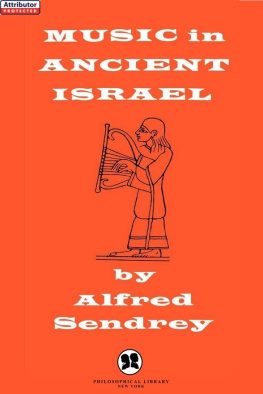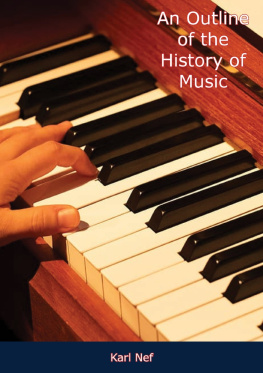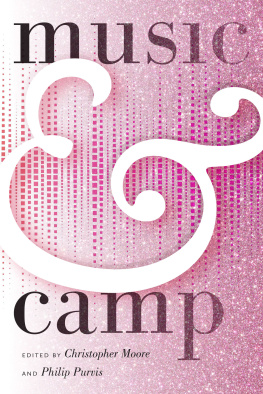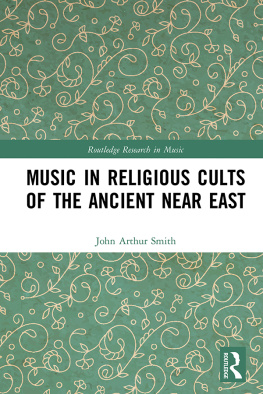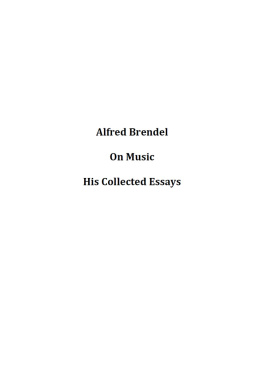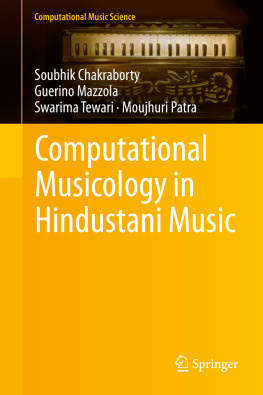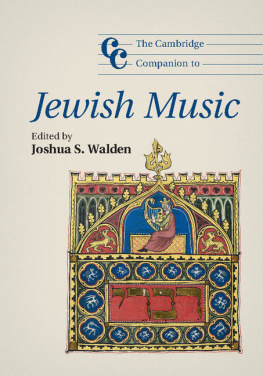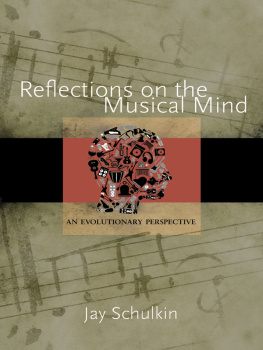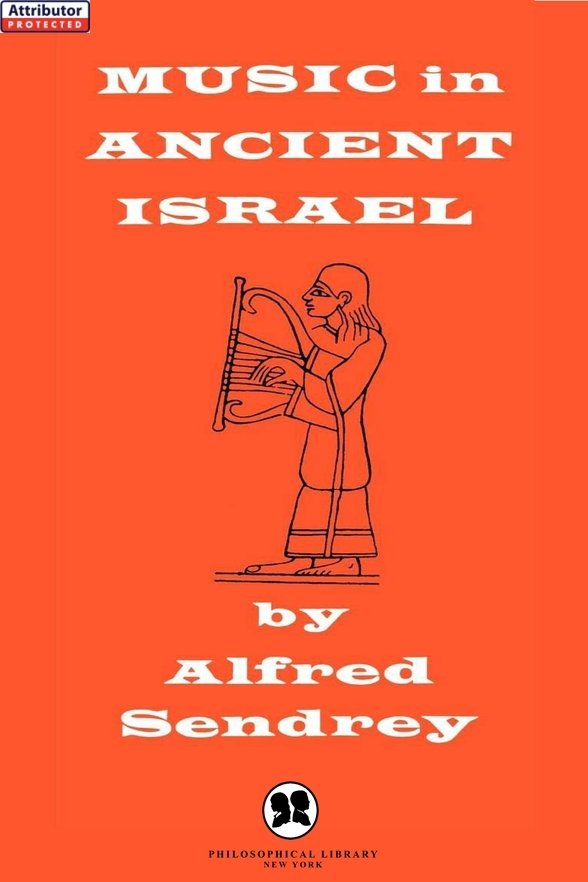ACKNOWLEDGMENTS
It is the authors pleasant duty to express his appreciation to all the persons who, through the long development and the many transmutations of the present work, gave him encouragement and valuable advice.
In the first place, he is deeply indebted to Prof. C URT S ACHS and Dr. J OSEPH Y ASSER , who read the entire manuscript and whose suggestions and constructive criticism were invaluable for the final formulation of the text.
Sincere thanks are also due Mr. R OBERT S TRASSBURG, who helped with the reading of the proofs and who, furthermore, gave the author unstintingly of his time and effort.
To the Jewish Community Library at Los Angeles and its librarians, Rabbi R UDOLPH L UPO and S HIMEON B RISMAN, the author hereby conveys his gratitude for extended library facilities and much helpful advice accorded him.
The production of a voluminous work such as this would not have been possible without the material aid of two generous sponsors. They wish to remain anonymous; the authors heartfelt gratitude should be expressed for their unselfish and high-minded support.
Finally, the author expresses thanks to the editorial staff of the Philosophical Library. The co-operation between editors and author could not have been more harmonious.
Los Angeles, California, May 1968.
EPILOGUE
The above investigations represent the resume of our present knowledge of the music culture of Ancient Israel, as it has crystallized during many centuries through the research of innumerable scholars. The object of our scrutiny was to elucidate and expound this accumulated wealth of information from the angle of modern musicology and to-days music practice. For this purpose, it was necessary to analyze critically the prevailing divergences of opinion and thereby to find a clear path in the labyrinth of plausible doctrines and empty delusions. For some of the problems it will probably never be possible to obtain the ultimate clarity, unless unexpected new discoveries would afford a deeper insight into the life and music of Ancient Israel.
Fortunately, the facts that are acknowledged in todays findings are abundant enough for a formation of usable conclusions at least with regard to the principal questions, and this despite the prevalent opinion that the historic material furnished by our main source of music about Ancient Israel, the Bible, is rather scanty. True, as compared with our knowledge of the ancient Greek music, the biblical information about the music practice of the ancient Hebrews is quite limited in many respects. Yet, if we consider the fact that, with the exception of pictorial documents, only vague written records remained about the music of once great and powerful peoples of Antiquity, like the Egyptians, Assyrians, Babylonians, we have good reason to be grateful for what the biblical chroniclers have bequeathed us about the music of their nation.
The presentation and treatment of our subject was not determined as much by the volume of the preserved material as rather by its intrinsic value. An appreciation of the biblical indications about music with this view in mind, is bound to expose sufficiently their utmost importance. With all the sparsity of reporting, they contain such a wealth of valuable and revealing details that one needs but to interpret them correctly, that is, to detect their historic, psychological and artistic implications in order to obtain a vivid picture of Ancient Israels music culture.
By a closer examination of the biblical material we arrive frequently to unexpected and surprising vistas. A world unfolds before our eyes that one would not suspect at a superficial glance. We fathom the depths of Israels musical soul; we see the organizational skill of this people, witness its individuality and resourcefulness in matters musical. With a sympathetic appreciation of the seemingly scarce material, we discover it to be rich and significant, indeed a precious legacy that has been benevolently left to posterity.
The preponderantly philosophical disposition of the Greeks brought forth an important musical system, showing, however, unmistakable signs of purely intellectual construction. Not nature, but logical consideration is at the origin of Greek music. With all its loftiness, it is a scheme without blooming life. It stems from reflection, and not from emotion. It is irrelevant that the great philosophers of the Hellenes ascribed to music high educational value and considered it particularly appropriate to shape the character of young men. It is, and remains, applied philosophy, the last motivation of which is the intellect and not the soul.
By their inner nature, the Israelites have not been philosophically bent. Their creative talents manifested themselves in other domains: in those of the soul and emotions. The characteristic Jewish spirit is responsible for having created a new world outlook (Weltanschauung), a new moral philosophy, which has inaugurated a spiritual revolution and eventually became the rock foundation of the entire Occidental civilization. With the Jewish notion of God as the unique and supreme creative power, with the moral approach of the Jews to all phenomena of life, the thinking, feeling, and the forms of living of the entire civilized world underwent eventually a profound transformation. In contrast to all other ancient peoples, the Israelites became creative not so much through their intellectual capacities, as through the emotional power of their soul. Their music, too, was not the product of reflection, but of intuition, of inspiration.
The music of the Occident is primarily the incarnation of the form-principle. The specific stylistic feature of Oriental music is emotion. Form alone is a notion without life, but it can be spiritualized by the emanations of the soul. Only the subjective capacity of psychic experience bestows upon form its intrinsic substance, its raison dtre.
This subjective capacity of psychic experience is not the logos, but the ethos; it is not the ratio but the religio; is not the form, but the soul.
History shows that the Hebrews have not been overly productive in purely intellectual endeavors; their culture was not centered in philosophy, in formal beaux-arts. Their main achievements were in the domain of emotions which brought them to the fore in poetico-musical, prophetic, and religious arts. This is not due, as frequently asserted, to the incapacity of the Jew for formative art products, but to the religious prohibition of making images. The forte of Jewish creative spirit lies therefore not in the plastic, but in the emotional arts, such as poetry and music. If this was a handicap in one respect, it represented a definite advantage for the inborn musical genius of the Jews. Philosophically considered, this determines the relationship of the Jews to music.
Yet, still another factor became determinative for this relationship: the correlation between man and his environment. In no other art is the influence of the environment, of the surrounding nature so important as in music.
The soul of a landscape is determinative for a people, it decides its entelechy.
To put it in another way, this means that the condition of a peoples individuality is largely influenced by the surrounding landscape, which, in turn, brings forth this peoples innate potentialities. This becomes evident in the music of the Israelites. As long as they were a people of the desert, leading a nomadic existence, they could not develop a musical art of their own. But once settled in the fertile valleys of Cana


